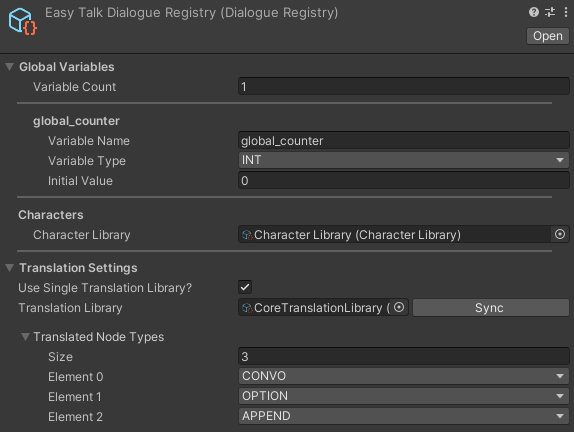Dialogue Registry

The purpose of the Dialogue Registry is to allow for the centralized configuration of various dialogue-related entities, such as global variables, character libraries, and translation settings and libraries.
You can configure and modify the Dialogue Registry which comes with EasyTalk for use in your projects. If you would prefer to create your own Dialogue Registry, you can do so, but just remember to do the following two things:
- Update the Dialogue Registry on the EasyTalk Editor Settings asset to the one you're using.
- Update the Dialogue Registry on the EasyTalk Dialogue Settings asset you're using (Hint: You can find the Dialogue Settings you are using in the inspector for your Dialogue Display).
Global Variables
Global variables are defined in the registry for use in the Editor and during runtime/gameplay.
Variable Count
Determines the total number of global variables defined in the registry. Each variable definition has the following properties:
- Variable Name - The name of the variable.
- Variable Type - The variable type (INT, FLOAT, BOOL, or STRING).
- Initial Value - The initial value of the variable.
Characters
Allows for a character library to be configured which can be used to show icons and character panels during gameplay.
Translation Settings
Use Single Translation Library
When toggled on or set to true, EasyTalk will use a single core translation library to perform translations during gameplay, rather than using the individual translation libraries of each dialogue asset.
The "Sync" button can be used to quickly sync the core library with all of your dialogue assets, which is done in a bidirectional manner. This causes two things to happen:
- All of the dialogue assets will be updated with any releveant translations which are in the core library.
- An entry will be added to the core library for any original language text entries that exist in dialogue assets in the project, along with those entries' translations, if they exist.
- Translation Library - This defines the core translation library to use.
Translated Node Types
Defines which node types fields are pushed to translation libraries and translated during runtime. By default, only Conversation nodes, Option nodes, and Append nodes are translated.